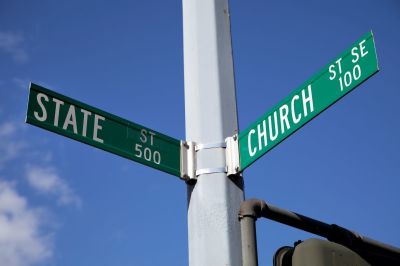What is the role of the Church in the political world?

Should churches be involved in politics?
Yes, but as the Church, not the religious wing of a party or campaign organization.
That brings up the crucial question: What is the “Church”?
Only the Bible can answer this, and it says that the church is the “Body of Christ.” That is, the Church is the means by which Jesus continues to walk in the world with His incarnate ministry. The Church is to walk through all the categories of human endeavor, including home and family, education, media, business, arts and sciences, social services, and, yes, politics and government and political processes that bring about governments and their regimes.
The weapons of her warfare are not to be “carnal,” which is the same as the earthly kingdoms employ, but heavenly in their nature and application. But here’s where a second definition of church, according to the New Testament, comes into play: Paul writes that Christians are “ambassadors for Christ” (2 Corinthians 5:20). Therefore, the biblical church is the embassy, the outpost, of the Kingdom of Heaven in the fallen world, and must present itself as that in whatever secular relationship with which it engages — including politics and government.
One of the best illustrations of this in diplomacy was set by the Polish ambassador to the Nazi-aligned Soviet Union in 1939, after the Nazis had crushed Poland.
Andre Vishinsky, Soviet Commissar for Foreign Affairs, shoved a note in the face of the Polish ambassador, and stated, “Poland has ceased to exist!”
“Poland will never cease to exist!” replied the ambassador as he refused to accept the document Vishinsky held in his hand.
There was no question but that the Polish ambassador knew whom he represented.
If Christians are the ambassadors of God's Kingdom, then the true Church, for Jesus, is the outpost or Embassy of the Kingdom of Heaven within the created world. The church reveals her outpost nature in two ways: first, she is the representative of one nation inside another nation. Her national interests are to be totally concentrated on the Kingdom of God. Any involvement in earthly public affairs is for the purpose of serving those kingdom interests, like Christlike love and service to humanity.
In Exodus 19:6 God told Israel it was ordained to be a “holy nation.” He affirmed this also to the Church, the “spiritual Israel” and Simon Peter. The holy nation is set apart and is to be guided by heavenly values and worldviews. The secular state is not the holy nation. History shows that when the secular state forgets this tyranny results.
Citizens of the Kingdom of Heaven are also citizens of the earthly realm. It is because of their heavenly citizenship that they are to be the best citizens of the earthly countries.
Therefore, when the church through its people goes into the political arena, it must do so as the representative of the interests of the Kingdom of Heaven, and, as the Polish ambassador in WWII showed, when there is conflict, they must always stand up for the interests of the kingdom which they serve as an ambassador.
Among other things, those Bible-believing Christians working in the Donald Trump camp — as representatives from the Kingdom of Heaven must dare to challenge Trump when he goes on a romp that is anything but Christian in its expression. At the same time, Christians serving in the Biden campaign must dare to challenge him with regard to non-biblical views of the right to life and the nature of family.
When I think of all of this, my thoughts are drawn to Dr. Richard Halverson, late pastor of Washington's Fourth Presbyterian Church and chaplain of the United States Senate.
Dr. Halverson was consulted often by people from both sides of the aisle in Washington. He always thought of himself as a pastor, guided by Jesus and the Scriptures. He ministered the Word of God to Republicans and Democrats. He held the hand of hurting people in the United States government whether from the right or the left.
I was once with Dr. Halverson in a meeting with political leaders in Latin America. During one session, a participant raised the issue of potential warfare with another of the national leaders in the room. The tension mounted. After careful thought Dr. Halverson, who was sitting at the end of the table, said, simply, “let's pray about this.” And pray we did. The leaders who were adversaries suddenly found themselves bathed in the pastoral council and prayer lifted by Dr. Halverson.
The Holy Spirit’s presence displaced that of conflict. The very atmosphere of the room was changed from war talk to a sense of peace and reconciliation, all because an ambassador of Christ's Kingdom remembered whom he served and spoke from the perspective of that heavenly kingdom.
That's the way the Church is to be engaged in politics. She is to be who she is in her true identity — ambassadors for the Lord Jesus Christ in this war-threatened world.
Wallace B. Henley is a former pastor, daily newspaper editor, White House and Congressional aide. He served 18 years as a teaching pastor at Houston's Second Baptist Church. Henley is author or co-author of more than 25 books, including God and Churchill, co-authored with Sir Winston Churchill's great grandson, Jonathan Sandys. Henley's latest book is Who will rule the coming 'gods'? The looming spiritual crisis of artificial intelligence.




























